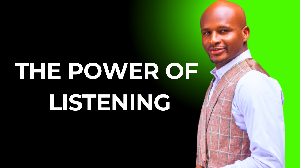
In a world that often prioritizes speaking, listening can feel like an afterthought. Yet, it's arguably the most crucial component of effective communication. Listening isn't just about hearing words; it's about understanding, empathizing, and connecting.
Why Listening Matters
• Builds Relationships: When we truly listen, we show others that we value their thoughts and opinions. This fosters trust and strengthens relationships.
• Improves Understanding: Active listening helps us grasp the nuances of a conversation, ensuring that we're not just hearing words but comprehending the underlying message.
• Reduces Conflict: Misunderstandings often stem from ineffective listening. By paying attention, we can avoid conflicts and resolve disagreements more peacefully.
• Enhances Creativity: Listening to diverse perspectives can spark new ideas and foster innovation.
• Boosts Self-Confidence: Feeling heard and understood can boost a person's self-esteem and confidence.
How to Be a Better Listener
1. Give Your Full Attention: Put away distractions and focus on the speaker. Maintain eye contact, nod occasionally, and avoid interrupting.
2. Paraphrase: Restate what you've heard in your own words to ensure understanding. This shows that you're actively engaged.
3. Ask Open-Ended Questions: Encourage the speaker to elaborate by asking questions that require more than a simple "yes" or "no" answer.
4. Empathize: Try to see things from the speaker's perspective. Show that you understand their feelings and emotions.
5. Avoid Interrupting: Let the speaker finish their thoughts before responding. Interrupting can make the other person feel unheard.
The Benefits of Listening in Ghana
In Ghana, a culture known for its hospitality and respect for elders, listening plays a vital role in social interactions. By practicing active listening, Ghanaians can strengthen community bonds, resolve conflicts peacefully, and foster a more harmonious society.
Conclusion
Listening is a skill that can be learned and improved upon. By making a conscious effort to be a better listener, we can enhance our relationships, improve our communication, and create a more understanding world. So, the next time you're in a conversation, remember the power of listening and make a conscious effort to truly hear what the other person is saying.
Written By:
Ibrahim Mustapha
Public Speaking Coach
+233554650104